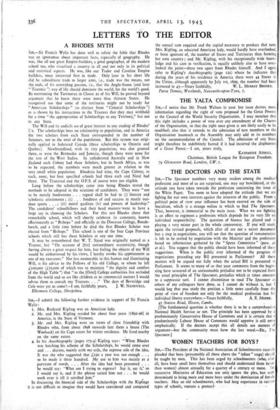A RHODES MYTH
LETTERS TO THE EDITOR
Sta,—Sir Francis Wylie has done well to refute the fable that Rhodes was an ignoramus about important facts, especially of geography. He was, like all our great Empire-builders, a good geographer, of the modern school too, who visualised a country in all and not only in its political and statistical' aspects. He was, like our Tudor and Caroline Empire builders, most interested first in trade. Only later in his short life did he subordinate trade to larger aims, i.e., trade was the means, not the ends, of his overriding passion, i.e., that the Anglo-Saxon (and later "Teutonic ") way of life should dominate the world, for the world's good. By mentioning the Territories in Clause zo of his Will, he proved beyond argument that he knew there were more than thirteen States. He recognised too that some of the territories might not be ready for " American Scholarships " (as distinct from " Colonial Scholarships ") as is shown by his instructions to the Trustees that they may withhold for a time " the appropriation of Scholarships to any Territory," but not to any State.
The Will and its codicils are of great interest to any, student of Rhodes' J! e. The scholarships bore no relationship to population, and in America the two scholars from each 'State corresponded to the number of Senators, not to the total of the population. But this system was origi- nally applied to federated Canada (three scholarships to Ontario and Quebec). Newfoundland, with its tiny population, was also granted three, as were the Bermudas and Jamaica, though there were none for the rest of the West Indies. In unfederated Australia and in New Zealand each Colony had three Scholars, but in South Africa, as was to be expected, the numbers were much greater in relation to the very small white population. Rhodesia had nine, the Cape Colony, as such, none, but four specified schools had three each and Natal had three. The Transvaal and the O.F.S. of course were not eligible.
Long before the scholarships came into being Rhodes tested the methods to be adopted in the selection of candidates. They were " not to be merely bookworms . . . regard shall be had to (i) literary and
scholastic attainments ; . . . fondness of and success in manly out- door sports . . . ; (iii) moral qualities (iv) and powers of leadership." The candidates' schoolfellows and their head mastersewere to have a large say in choosing the Scholars. For this test Rhodes chose that remarkable school, which will shortly celebrate its centenary, known affectionately as " Bishops " and officially as the Diocesan College, Ronde- bosch, and a little time before he died the first Rhodes Scholar was elected from " Bishops." This school is one of the four Cape Province schools which still has three Scholars at any one time.
It may be remembered that W. T. Stead was originally named as a Trustee, but " On account of [his] extraordinary eccentricity, though having always a great respect for him, but feeling the objects of my Will would be embarrassed by his views, I hereby revoke his appointment as one of my executors." Not less memorable in this human and illuminating Will, is his advice to the Fellows of his old College, to whom he left Ltoo,000 (Do,000 of which was to maintain " the dignity and comfort of the High Table ") that " as the [Oriel] College authorities live secluded from the world and so are like children as to commercial matters I would advise them to consult my Trustees. . . ." The days of Beveridge and
Cole were yet to come!—I am, faithfully yours, J. W. NANKIVELL. Ellesmere. College, Shropshire.


























 Previous page
Previous page